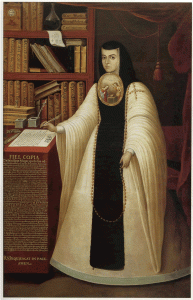Hombres Necios Que Acusáis (Silly Men Who Accuse)
Listen to the poem in Spanish
Silly Men Who Accuse — Read by Sahara Al-Madi
Sor Juana Inés de la Cruz — Original Text
Hombres necios que acusáis
a la mujer sin razón,
sin ver que sois la ocasión
de lo mismo que culpáis.
Si con ansia sin igual
solicitáis su desdén,
¿por qué queréis que obren bien
si las incitáis al mal?
Combatís su resistencia
y luego con gravedad
decís que fue liviandad
lo que hizo la diligencia.
Parecer quiere el denuedo
de vuestro parecer loco
al niño que pone el coco
y luego le tiene miedo.
Queréis con presunción necia
hallar a la que buscáis,
para pretendida, Tais,
y en la posesión, Lucrecia
¿Qué humor puede ser más raro
que el que, falto de consejo,
él mismo empaña el espejo
y siente que no esté claro?
Con el favor y el desdén
tenéis condición igual,
quejándoos, si os tratan mal,
burlándoos, si os quieren bien.
Opinión ninguna gana,
pues la que más se recata,
si no os admite, es ingrata,
y si os admite, es liviana.
Siempre tan necios andáis
que con desigual nivel
a una culpáis por cruel
y a otra por fácil culpáis.
¿Pues cómo ha de estar templada
la que vuestro amor pretende,
si la que es ingrata ofende
y la que es fácil enfada?
Mas entre el enfado y pena
que vuestro gusto refiere,
bien haya la que no os quiere
y queja enhorabuena.
Dan vuestras amantes penas
a sus libertades alas
y después de hacerlas malas
las queréis hallar muy buenas.
¿Cuál mayor culpa ha tenido
en una pasión errada:
la que cae de rogada
o el que ruega de caído?
¿O cuál es más de culpar,
aunque cualquiera mal haga:
la que peca por la paga
o el que paga por pecar?
¿Pues para qué os espantáis
de la culpa que tenéis?
Queredlas cual las hacéis
o hacedlas cual las buscáis.
Dejad de solicitar
y después con más razón
acusaréis la afición
de la que os fuere a rogar.Bien con muchas
armas fundo
que lidia vuestra arrogancia,
pues en promesa e instancia
juntáis diablo, carne y mundo.
English Translation
Silly, you men-so very adept
at wrongly faulting womankind,
not seeing you’re alone to blame
for faults you plant in a woman’s mind.
After you’ve won by urgent plea
the right to tarnish her good name,
you still expect her to behave—
you, that coaxed her into shame.
You batter her resistance down
and then, all righteousness, proclaim
that feminine frivolity,
not your persistence, is to blame.
When it comes to bravely posturing,
your witlessness must take the prize:
you’re the child that makes a bogeyman,
and then recoils in fear and cries.
Presumptuous beyond belief,
you’d have the woman you pursue
be Thais when you’re courting her,
Lucretia once she falls to you.
For plain default of common sense,
could any action be so queer
as oneself to cloud the mirror,
then complain that it’s not clear?
Whether you’re favored or disdained,
nothing can leave you satisfied.
You whimper if you’re turned away,
you sneer if you’ve been gratified.
With you, no woman can hope to score;
whichever way, she’s bound to lose;
spurning you, she’s ungrateful—
succumbing, you call her lewd.
Your folly is always the same:
you apply a single rule
to the one you accuse of looseness
and the one you brand as cruel.
What happy mean could there be
for the woman who catches your eye,
if, unresponsive, she offends,
yet whose complaisance you decry?
Still, whether it’s torment or anger—
and both ways you’ve yourselves to blame—
God bless the woman who won’t have you,
no matter how loud you complain.
It’s your persistent entreaties
that change her from timid to bold.
Having made her thereby naughty,
you would have her good as gold.
So where does the greater guilt lie
for a passion that should not be:
with the man who pleads out of baseness
or the woman debased by his plea?
Or which is more to be blamed—
though both will have cause for chagrin:
the woman who sins for money
or the man who pays money to sin?
So why are you men all so stunned
at the thought you’re all guilty alike?
Either like them for what you’ve made them
or make of them what you can like.
If you’d give up pursuing them,
you’d discover, without a doubt,
you’ve a stronger case to make
against those who seek you out.
I well know what powerful arms
you wield in pressing for evil:
your arrogance is allied
with the world, the flesh, and the devil!
Author Notes

Sor Juana Inés de la Cruz
Mexican poet (1648-1695)
She was of Spanish ancestry and resided in Mexico. Sor Juana was an influential feminist who was also a 17th century nun, self-taught scholar and acclaimed writer within the Hispanic Baroque period. Sor Juana taught herself all that she could through the access of her grandfather’s library where she mastered logic, Latin and the Aztec language, Nahuatl.
Sources
Poets, Academy of American. You Foolish Men by Sor Juana Inés de La Cruz – Poems | Academy of American Poets. https://poets.org/poem/you-foolish-men. Accessed 19 Dec. 2021.
“Sor Juana Inés de La Cruz – Hombres Necios Que Acusáis.” Genius, https://genius.com/Sor-juana-ines-de-la-cruz-hombres-necios-que-acusais-annotated. Accessed 20 Dec. 2021.
